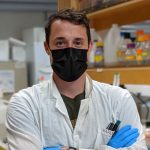Hua Wei: Plant Physiology First Author

 Hua Wei, first author of “Rice CIRCADIAN CLOCK ASSOCIATED1 transcriptionally regulates ABA signaling to confer multiple abiotic stress tolerance”
Hua Wei, first author of “Rice CIRCADIAN CLOCK ASSOCIATED1 transcriptionally regulates ABA signaling to confer multiple abiotic stress tolerance”
Current Position: Agricultural Genomics Institute at Shenzhen, Chinese Academy of Agricultural Sciences, Postdoctor
Education: Institute of Botany, Chinese Academy of Sciences, Doctor
Non-scientific Interests: Running
Brief bio: Rice (Oryza sativa L.) is one of the main food sources for the word population, which possessed a long history of cultivation and consumption. However, abiotic factors are fundamental components that seriously restrict rice productivity. During my postgraduate studies at the team of Lei Wang professor, I learned that plant circadian clock systems play an indispensable role for synchronizing its developmental and physiological behaviors to support growth and environmental adaptability. Hence, I began to take an interest in how circadian clock components regulate the adaptation to high salinity and drought environments. In this study, we found that OsCCA1 (Oryza sativa CIRCADIAN CLOCK ASSOCIATED 1) regulates the transcription of many stress-related genes by integrating ABA (abscisic acid) signaling networks, which regulates the adaptability of rice to high-salt, drought and osmotic stress environments.
论文:“Rice CIRCADIAN CLOCK ASSOCIATED1 transcriptionally regulates ABA signaling to confer multiple abiotic stress tolerance”
姓名:魏华
职位:中国农业科学院深圳农业基因组研究所,博士后
学历:中国科学院植物研究所,理学博士
爱好:跑步
个人简介:
水稻是全球人类重要的粮食作物之一,有着悠久的耕种和食用历史。然而,非生物胁迫严重制约着水稻产量的提高。在中国科学院植物研究所王雷研究员团队学习期间,我了解到生物钟系统在调控植物生长发育和环境适应性中发挥着不可或缺的作用,并对生物钟关键组分如何调控水稻适应高盐、干旱等胁迫环境产生了浓厚的兴趣。我们的研究发现生物钟核心组分OsCCA1 (Oryza sativa CIRCADIAN CLOCK ASSOCIATED 1)通过整合ABA (abscisic acid)信号网络,调节诸多胁迫应答相关基因的表达,进而正调控水稻对高盐、干旱以及渗透胁迫环境的适应性。



